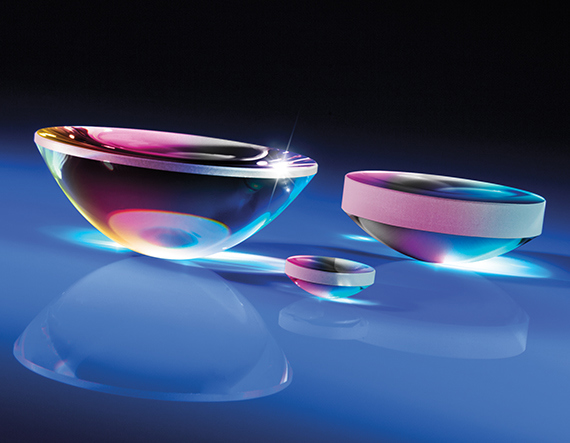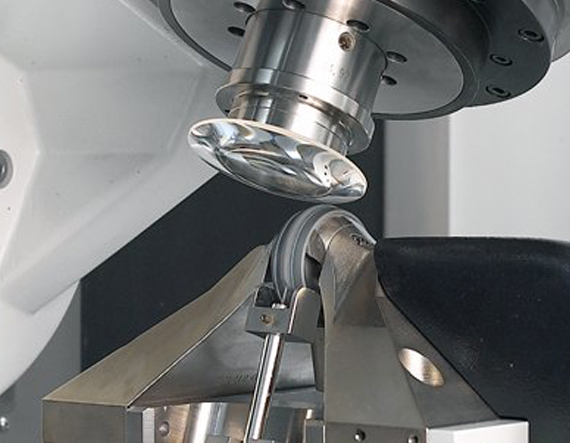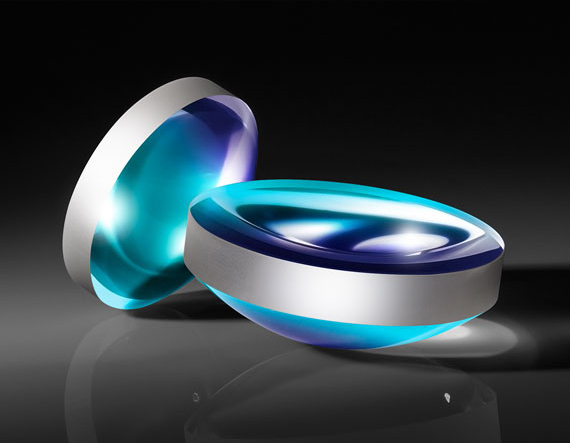
|
|
Spherical lenses being swapped out for aspheric lenses to reduce system size and weight |
|
|
A single aspheric lens can replace a complex system of multiple spherical lenses |
|
|
Advances in aspheric manufacturing have made aspheres produced by grinding and polishing more cost effective |
|
|
System cost and weight reduced while maintaining or improving performance |
Aspheric lenses have been used for decades to reduce spherical aberration and improve the performance of optical systems, but their high cost made them cost prohibitive in many applications. Recent advances in aspheric grinding and polishing have allowed subaperture polishing to produce high quality aspheres without requiring magneto-rheological finishing (MRF), greatly reducing cost. A single one of these more affordable, high-performance aspheric lenses can replace multiple spherical lenses with either the same or better performance, leading to lighter, smaller, and less complex systems at a lower cost than previously possible.
Learn about the benefits of using aspheres in optical system design and what factors are taken into account during the design process in our webinar presented by Oleg Leonov, Asphere Business Development Manager, and Amy Frantz, Optical Engineer.

Edmund Optics’ aspheric lens production cell operates 24 hours a day to manufacture thousands of aspheric lenses every month. Whether you require a stock component from our vast inventory of over 600 aspheric lens designs, a build-to-print lens, or a fully custom asphere design, Edmund Optics has a solution to meet your needs manufactured through either molding, diamond turning, or subaperture grinding and polishing.
Learn More
Even with the advances in aspheric subaperture grinding and polishing, magnetorheological finishing (MRF) is still needed to manufacture the highest quality of aspheres. MRF is a deterministic and computer controlled process that removes many of the manual steps and guesswork necessary typically involved in finishing a fine optical surface.
Learn More
Edmund Optics utilizes a wide variety of metrology equipment to ensure the quality of aspheres and other optical components manufactured in our global manufacturing facilities including interferometry, profilometry, coordinate measuring machines, and computer generated holography.
Learn More Haven’t aspheres been around for decades? Why is this a current trend?
Haven’t aspheres been around for decades? Why is this a current trend?
 What exact kind of metrology does Edmund Optics use to support its asphere manufacturing?
What exact kind of metrology does Edmund Optics use to support its asphere manufacturing?
Edmund Optics utilizes a wide range of metrology to support our asphere manufacturing including Talysurf PGI 1240 profilometers, QED ASI aspheric stitching interferometers, Zygo® NewView white light interferometers, OptiPro UltraSurf 4X 100 non-contact profilometers, TRIOPTICS Opticentric® centering machines, Zeiss Contura G2 coordinate measuring machines (CMMs), Olympus MX51 microscopes, design-specific computer generated holograms (CGHs), and null lenses.
 What are Edmund Optics’ typical manufacturing tolerances?
What are Edmund Optics’ typical manufacturing tolerances?
A full list of Edmund Optics’ manufacturing tolerances can be found on our Aspheric Manufacturing Capabilities page.
 Does Edmund Optics still use magnetorheological finishing for high quality aspheres?
Does Edmund Optics still use magnetorheological finishing for high quality aspheres?
Yes, magnetorheological finishing (MRF) is still required for the highest quality aspheres and can achieve accuracies exceeding λ/20.
 What are the different types of aspheric lenses?
What are the different types of aspheric lenses?
There are many different types of aspheric lenses with their own advantages and disadvantages, as shown in the table below:
| Asphere Type | Description | Relative Price |
|---|---|---|
| Precision Aspherized Achromatic Lenses | Diffraction-limited and color-corrected doublet with aspheric surface for broadband applications | $$$$ |
| “Laser-Grade” Aspheres | <λ/10 transmitted wavefront | $$$ |
| Precision Polished Aspheres | Most common asphere type, offering a balance between cost and performance | $$ |
| Best Form Aspheres | Modified PCX or PCV lenses with one aspheric surface | $$ |
| Diamond Turned Aspheres | Made out of high end plastics and crystalline materials | $$ |
| Hybrid Aspherized Achromatic Lenses | Low cost doublet with molded polymer diffractive surface to minimize chromatic aberration | $ |
| Molded Aspheres | Low cost plastic or glass lenses suited for high volume production | $ |
or view regional numbers
QUOTE TOOL
enter stock numbers to begin
Copyright 2023, Edmund Optics India Private Limited, #267, Greystone Building, Second Floor, 6th Cross Rd, Binnamangala, Stage 1, Indiranagar, Bengaluru, Karnataka, India 560038
California Consumer Privacy Acts (CCPA): Do Not Sell or Share My Personal Information
California Transparency in Supply Chains Act
The FUTURE Depends On Optics®